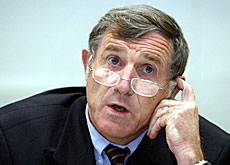Too rich to reform

Retiring State Secretary for Economic Affairs David Syz says the Swiss political system must be overhauled if the country is to regain its competitive edge.
He said one reason growth had been slower than anywhere else in the industrialised world was because the Swiss were too well off to accept radical reform.
In his last interview before stepping down on March 31, Syz said the country urgently needed to speed up the process of political and economic reform.
Syz was appointed head of the State Secretariat for Economic Affairs (Seco) in July 1999 after three decades in the private sector.
Prior to his arrival in the Swiss capital, Bern, Syz worked for Switzerland’s largest bank, UBS, and was chairman and chief executive of the Swiss industrial firm, SIG.
In an interview with swissinfo, the 60-year-old Syz talked about the challenges facing the Swiss economy – and why Switzerland cannot rest on its laurels if it is to avoid becoming the sick man of Europe.
swissinfo: You joined Seco from the private sector. How difficult was it to adjust to life in public office?
David Syz: It was a real culture shock, but you adapt to it. The decision-making process is very different. It is much slower; you have to consult with more people and you can’t take snap decisions because you have to reach agreement with everybody. What can also be frustrating at times is that you do not immediately see the results of what you are doing.
We really have to reform the decision-making process. Things have moved on: today we have to be internationally competitive and this requires more speed and more drastic decisions.
swissinfo: The Organisation for Economic Cooperation and Development says Switzerland must become more competitive. Is the slow process of reform in Switzerland hindering economic progress?
D.S.: Absolutely. But the problem is built into our political system: it is consensus-driven which makes it almost impossible to move quickly.
We are still in a strong position and as long as everything is more or less on track there is not enough pressure to reform. We are probably going to have to wait until the economic reality forces us to reform or until we are pressured into doing so from the outside.
swissinfo: You have said before that Switzerland needs a government that can set clear priorities and have the courage to take difficult, unpopular decisions.
D.S.: Unfortunately, this is correct. If you look at the government’s reform programme over the next four years, it’s not a real programme. It’s just a list of problems we have to solve… which doesn’t bring us forward. The political parties need to discuss reform together and find a common solution.
swissinfo: What will happen if the process of reform does not speed up?
D.S.: If we do not move faster, we will lose ground. The problem is that we are too well off to take unpopular decisions. I fear that things will have to get worse before they get better, but I hope we’ll react before this happens.
I think we really have to work not just on economic reform but also on reforming our institutions.
swissinfo: Negotiations on a second set of Swiss-EU accords have stalled and the political climate between Bern and Brussels seems to have deteriorated of late. Is the bilateral approach feasible, or does economic prosperity depend on EU membership?
D.S.: For now we have to focus on the bilateral track. I’m still convinced we can move forward with this and am optimistic we will be able to wrap up negotiations in the next few months. But the EU is becoming more and more impatient and doesn’t want to give Switzerland special treatment. So the pressure will increase and maybe one day we’ll have had enough and move into Europe.
The bilateral way still offers more advantages than disadvantages, but that may change. We will eventually have to become an EU member when we see that it is in the interests of our economy and security to join. It’s not the case right now, but the day will come.
swissinfo: Ten new countries – mainly from central and eastern Europe – will join the EU on May 1. How much of an opportunity is this for Swiss business?
D.S.: It’s a real opportunity. Although Swiss business with these countries represents only a small fraction of our overall foreign trade, I am convinced that it will pick up soon. These countries have an excellent long-term growth potential which will hopefully also boost the economy in the EU in general – and indirectly the economy of Switzerland since the EU is our major trading partner.
swissinfo: During five years at Seco you’ve presided over a period of economic stagnation and we’ve seen some big Swiss corporate and banking names laying off employees. Is this something you regret?
D.S.: Of course I feel for those who have lost their jobs. But I also see the need for reforms, and they unfortunately often involve restructuring and lay-offs. The role of Seco on the one hand is to make reforms happens and on the other hand to support people who are made redundant, to help create new jobs and to put more emphasis on education. But we should certainly not delay or postpone reforms – that would be the worst thing to do.
swissinfo: As the head of Seco you’ve led Swiss business delegations around the world. Has it been easy to fly the flag for Switzerland?
D.S.: To be honest, very easy. We are eighth in the world when it comes to foreign direct investment and are welcome everywhere. People sometimes ask whether it makes sense to set up a European headquarters in Switzerland since we are not in the EU. But even this issue is positive rather than negative, because people look at Switzerland as a liberal country with a strong network of free trade agreements, a strong financial market and this position is still intact.
swissinfo: On your travels you’ve had the opportunity to look back at Switzerland from the outside in. Do you see it becoming slowly but surely the sick man of Europe?
D.S.: Not the sick man, that is too strong. But Switzerland is viewed – especially by young people – as very traditional, slow moving and as a place which is respected for what it has done rather than for what it is looking to do now. The respect for Switzerland relies much more on the past than the present.
swissinfo: You’re heading back into the private sector, but you also plan to go into the film business to make a documentary about the effects of globalisation.
D.S.: Yes! I’ve learnt during my time here that there is a lot of misinformation about global issues. I want to start with some concrete examples of the effects of globalisation and produce a series of short films aimed at young people.
Globalisation has had a bad press and is not well understood, but it determines many aspects of our lives and as such is an issue we have to take seriously. So I’m off later this year to the New York Film Academy to learn about screenwriting and hopefully work out how I can make the subject interesting for young people!
swissinfo-interview: Ramsey Zarifeh
David Syz was born in 1944. He studied law at Zurich University before beginning his career as an assistant director at Switzerland’s largest bank, UBS.
In 1986 he was appointed chairman of the board and CEO of Swiss industrial concern, SIG.
Syz was appointed as the first head of the State Secretariat for Economic Affairs (Seco) in July 1999.
After nearly five years in the post, he was replaced on April 1 by the former director of the Federal Refugee Office, Jean-Daniel Gerber.

In compliance with the JTI standards
More: SWI swissinfo.ch certified by the Journalism Trust Initiative


You can find an overview of ongoing debates with our journalists here . Please join us!
If you want to start a conversation about a topic raised in this article or want to report factual errors, email us at english@swissinfo.ch.